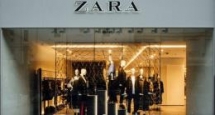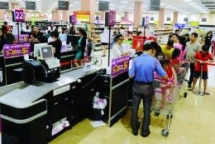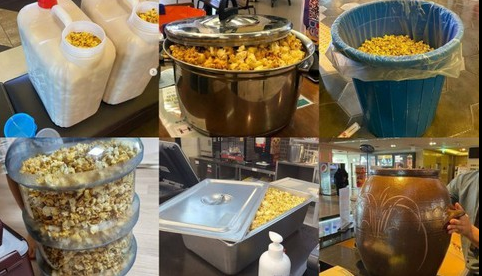South Korean shopping malls chase growth in Vietnam
| Indonesian retailers interested in Vietnamese market | |
| Japanese retailers keen on Vietnam | |
| Japanese retail giant to open first supermarket in Vietnam |
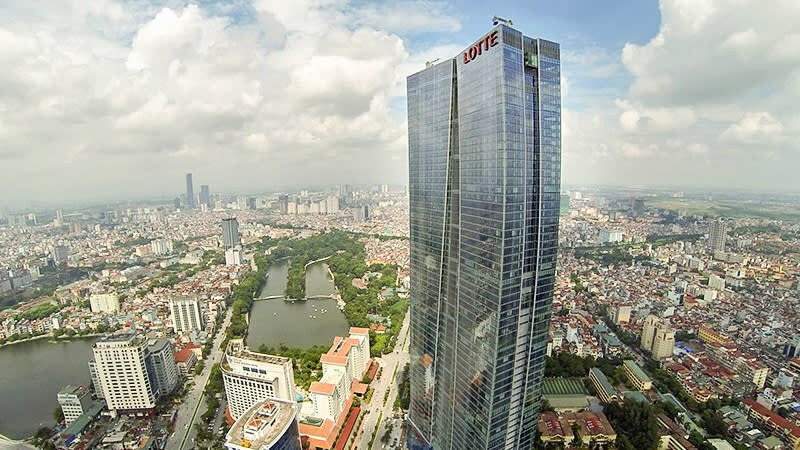 |
| The Lotte Center in Hanoi is one of the South Korean company's most prominent locations in Vietnam. |
Korean pop songs played over the speakers as young office workers browsed snacks and stationery at the GS25 convenience store in the Da Kao district of Ho Chi Minh City. The spicy ramen and sweet cookies lining the shelves were the same as they would find in Seoul.
South Korean manufacturers like Samsung Electronics and LG Electronics came to Vietnam decades ago, attracted by the country's cheap labor costs and rapidly growing population. Now, as Vietnam's wages rise and market conditions back home deteriorate, South Korea's retailers are increasingly following in the footsteps of their manufacturing compatriots -- but they are finding a crowded market and fierce competition from local brands and Japanese rivals.
Lotte Shopping, the subsidiary of a major South Korean conglomerate, paved the way, becoming the first South Korean retailer to enter Vietnam in 2008. It now operates 14 Lotte Mart supermarkets across the country and one department store in Hanoi.
Lotte was followed by E-Mart, one of South Korea's biggest retailers, which launched its first hypermarket store in Ho Chi Minh City in December 2015. Excited by success of the first shop in the Go Vap district -- which posted the biggest revenue for a single discount chain store in the city -- E-Mart is planning to set up another shop in the city next year.
"E-Mart Vietnam's first store is maintaining a high growth trend since its launch as we differentiated ourselves from others by offering a wide range of Korean products including delicacies and bakeries," the company said in its third quarter report released last month. "We are preparing to open our second store in Ho Chi Minh City next year," said Kim Bo-bae, a spokesperson for the company.
GS Retail, meanwhile, set up a joint venture with Vietnam's Son Kim Group through which it runs 54 convenience stores in the country under its GS25 brand.
The overseas push comes as online players take a bite out of retailers' market share in South Korea.
E-Mart and Lotte Shopping are expected to face the most negative credit risk next year as they struggle to fend off challenges from SoftBank-backed e-commerce Coupang and mobile food delivery service company Market Curly, according to credit ratings agency NICE.
"As online [companies] are expanding their influence, growth of offline retailers has slowed in 2019," said Ahn Young-bok, a director at NICE. "Offline retailers will see their earnings growth limited in 2020 as they face tough price competition and rising marketing and delivery costs."
Making matters worse, demand for offline retail is shrinking as South Korea's population ages and shifts toward one-person households, which tend to prefer to shop online rather than drive to brick-and-mortar discount shops.
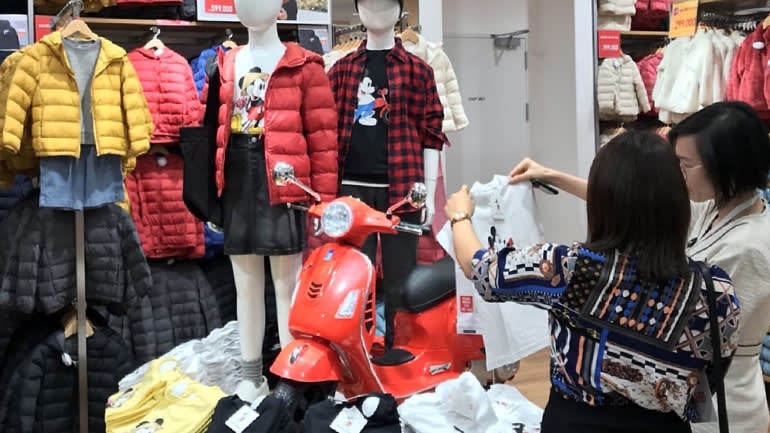 |
| Japan's Uniqlo opened its first store in Vietnam on Dec. 6 as the retail battle heats up. (Photo by Tomoya Onishi) |
Combined sales of offline retailers dropped to 16.7 trillion won ($14.2 billion) in the third quarter, down 100 billion won from the previous quarter, while that of online retailers rose by 300 billion won to 8.1 trillion won, according to government data
Vietnam offers opportunities for growth that South Korean retailers are missing at home. From 2013 to 2018, the retail sector in Vietnam recorded a compound annual growth rate, or CAGR, of 10.97%, according to Deloitte. Total retail revenue is expected to reach $180 billion by 2020, which would represent an increase of 26.6% from 2018.
But big opportunities have attracted tough competition, not only from local brands but also Japanese retailers, who have pushed aggressively into the country recently. Fast fashion retailer Uniqlo opened its first store in the country this month, drawing a throng of shoppers on its first day.
"Although Vietnam's retail sector holds immense potential for growth, the level of competition is intense," said Nguyen Vu Duc, consumer industry leader at Deloitte Vietnam. "Across different retail formats ... we are witnessing domestic and foreign retail giants engaged in a battle for dominance as they embark on aggressive expansion strategies."
Shifting tastes are likely to be a major factor in that battle.
Trang Ha works for a South Korean company in Ho Chi Minh City. When she and her friends were in their 20s, the Lotte Mart in District 7 -- one of first in the city -- was a favorite place for her and her friends to meet and go shopping. At the time, Lotte Mart offered the latest and most convenient shopping experience for Vietnamese consumers. The popularity of South Korean TV shows and K-pop also encouraged them to seek out South Korean-related goods -- but that was five or six years ago.
With more retailers, local and foreign, opening outlets across the city, the race to attract consumers is becoming more competitive.
Trang said Japan's Aeon and Takashimaya increasingly come up when she and her friends discuss where to go.
"Japanese retailers are gaining more attraction to local consumers as they provide better services, and offer more attractive decorations for different festivals or holidays", she said.
And while she rates Japanese and South Korean convenience stores highly for the service and selection, her decision on which one to shop at comes down to which one is most convenient to get to.
The big local players also have a size advantage. Vingroup, which entered the retail market in 2014, already has 122 supermarkets and more than 2,500 convenience stores across the country. Its leader has made expansion in prime locations a priority.
In December, moreover, Vingroup announced it is merging its retail operations with the consumer goods manufacturing operations of Masan Group to create the country's largest retail company.
Commercial centers that combine shopping and various entertainment options are particularly fierce area of competition between local and foreign players, according to Deloitte, with a total of 200 such facilities across the country.
Vingroup accounts for 60% of commercial center market by floor space in Hanoi and Ho Chi Minh City, followed by Aeon and Lotte.
As competition in this segment heats up in these two major cities, local brand Saigon Co.op is targeting the country's southwest provinces, where quality entertainment facilities are still few and far between.

